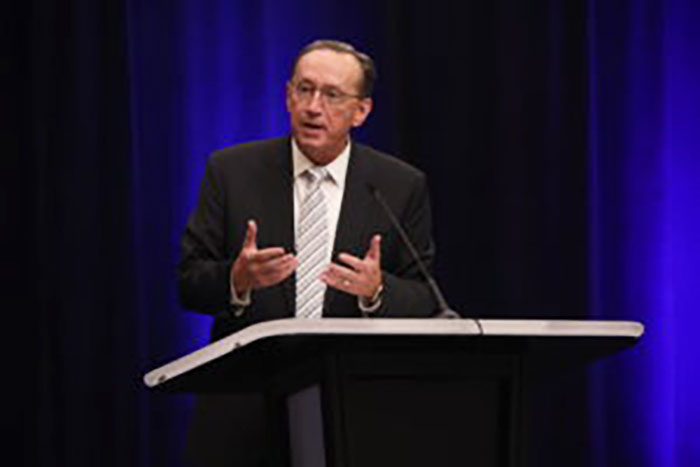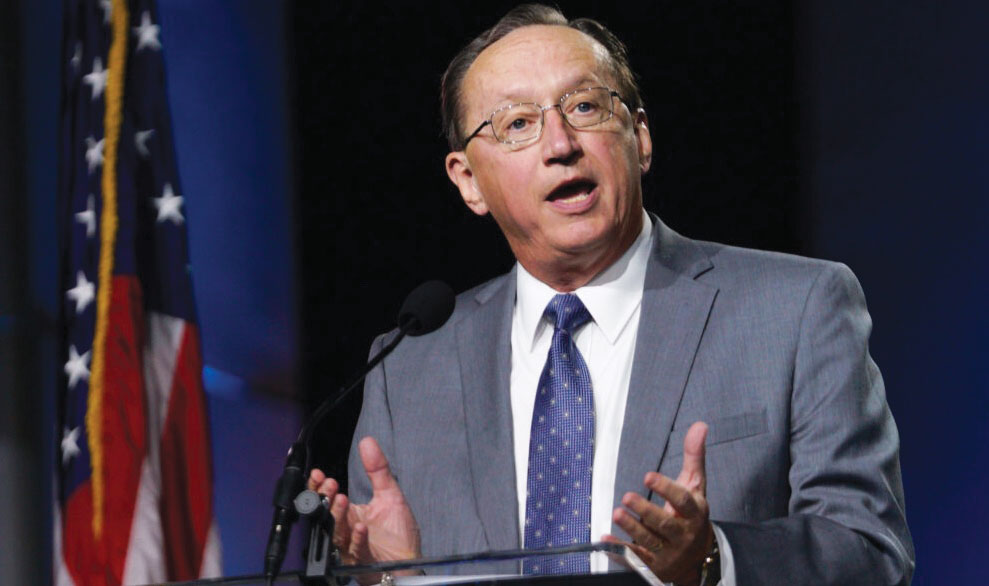Editor’s note: Baptist and Reflector editor Chris Turner had the opportunity on March 10 to interview Jeff Iorg, Southern Baptist Convention Executive Committee president and CEO for a B&R exclusive. Many of the questions to which Iorg responded were gathered from among Tennessee Baptist pastors.

Baptist & Reflector: Dr. Iorg, would you please explain why Cooperative Program (CP) dollars are being used to pay legal fees associated with the sexual abuse cases?
Iorg: Southern Baptists only have one revenue source and that’s the Cooperative Program, that’s how we pay our bills. We’re working to possibly sell the SBC building (in downtown Nashville), which would generate additional revenue that we could use instead. Until we accomplish that, the only source we have is the Cooperative Program.
B&R: Why were Executive Committee (EC) reserves used in the past on legal fees and why not CP? And were reserves not initially CP dollars?
Iorg: The Executive Committee leadership at the time tried to mitigate the impact on CP by using reserves first. Reserves were a mixture of two things, CP dollars and interest earned over the years on those investments as they’ve been collected. So, it would be difficult to sort out how much of that was CP and how much of it was earned income. But, yes, the reserves would have originated with CP.
B&R: The EC is proposing a $3 million special priority allocation designated for SBC legal expenses on which SBC messengers will vote in June at the SBC Annual Meeting in Dallas. If the budget proposed is amended and the $3 million priority allocation is removed or reduced from the budget, what are the EC’s contingency plans for meeting the anticipated legal expenses?
Iorg: If we sell the building before this summer, we’ll make our own amendment to eliminate the allocation. If we’ve not sold the building and the proposal fails, then we’ll have to have a motion for some other funding mechanism from the floor. I think that would involve some percentage reallocation of budget distributions [to entities]. I think [percentage reallocations] would be more complicated than the one we’ve proposed. So hopefully, we’ll either do this one, or we’ll use the resources from the building sale.
B&R: If you had to reallocate percentage distributions to entities, what do you anticipate the impact might be on the International Mission Board (IMB), North American Mission Board (NAMB) and the seminaries?
Iorg: They will be faced with the choice of reducing their expenditures or using some of their own reserves to offset these losses. Some people have asked if it would be possible for the entities to give money back to the EC to cover these losses? That’s much more complicated than it sounds. By using their own resources to offset the shortfall we get to the same place at the end without transferring money back and forth.
B&R: Assuming the budget proposal for the $3 million special priority allocation is adopted by messengers, what amount do you think SBC churches will divert from CP to designated gifts to state conventions and SBC institutions to avoid contributing to legal costs?

Iorg: I think there will be some who will divert, no question, but pastors are also saying to me that they understand the problem and are going to see us through this. I would say to those pastors [who plan to divert CP funds] that when you divert those funds, you’re only passing the legal costs on to other churches. I think as pastors and other church leaders grapple with the situation, they’re realizing the best way to get through this is to get through it together. It’s not pleasant. I don’t like it. But it’s what I feel we have to do right now, and I’m hoping over the next few months many will come to see the same thing. We must stand together to get through this, and then we won’t do this again.
B&R: Do you feel like there is an end in sight with the SBC’s legal expenditures or do you see it coming in waves?
Iorg: The major expenses have all come out of the legal challenges rooted in the Guidepost Report and the people impacted by that. The statute of limitations for defamation related to that report has passed and the people who’ve been named in it have either sued us or have chosen not to. So, there is an end in sight. I believe that in the next 12 months the cases could be resolved. I’ve said before, Southern Baptists will always have ongoing legal costs. We always have. We always will, but those are manageable within our regular budget. Not the exorbitant expenses related to these special cases.
B&R: How would you address the “trust issue” many across the SBC express regarding the EC and SBC entities like the Ethics and Religious Liberties Commission (ERLC)?
Iorg: Trust is earned by competent service and trust has been broken. I acknowledge that. I hope pastors would give me the opportunity to rebuild trust with competent service [from the Executive Committee] that gets us through the current crises and brings us out the other side. One of the things that has been so encouraging to me has been the hundreds of people who have emailed me or called me or stopped me at meetings and said, “We’re with you. We believe you’re doing the right thing.”
I’m trying to avoid haphazard or rushed decisions. I’m more interested in methodical, systematic, real progress than I am haphazard or rushed decision-making that really doesn’t pay a benefit we need in the long run. I really believe that when we get these major legal issues resolved, and we get a framework for sexual abuse, prevention and response moving in our system, then I think we’re going to see remarkable progress in the next two to three years.
B&R: Given the change in stewardship culture, lack of trust in SBC institutions and many people’s perception that NAMB and IMB have migrated away from emphasizing CP giving and back to a societal giving model, what do you see as the future of the Cooperative Program as a unified giving tool.
Iorg: That’s a big question. First, I think that CP is our best unified giving tool, and I hope to strongly emphasize that this summer at the 100th anniversary. Secondly, I’ve specifically asked [NAMB president] [Kevin] Ezell and [IMB president] Dr. [Paul] Chitwood to work with me to make sure they are prioritizing the Cooperative Program as well as their special mission offerings in their promotional material and in their work. It’s got to be in the cases of the mission boards that they’ve got to have the Cooperative Program as the first thing they promote, and the first thing they depend upon, and then their own mission offerings second.
B&R: Many rural Southern Baptist churches are largely unaware of what the Executive Committee is and why the EC is important. How can the EC strengthen relations to this population of churches that make up the majority of the Southern Baptist Convention?
Iorg: We can strengthen relationships by doing our job well — which means quietly and efficiently. The EC should not be “the news.” We should be working behind the scenes to magnify the Cooperative Program and what it produces through the SBC’s entities and the work the entities are doing to expand God’s Kingdom in countless ways is the news.
B&R: Changing gears, it seems more of the SBC’s business is being discussed behind closed doors. Why has the Executive Committee trustee board spent so much time in executive session over the past four years?
Iorg: We are dealing in executive session only with legal, personnel, and what I would say are sensitive financial matters. There’s so many more of these issues right now. As we reduce those, we’ll have fewer executive sessions. We want to do our work in public, but there’s certain issues that we just feel like we can’t.
B&R: Do Southern Baptists need six physical seminary locations and if so, why?
Iorg: SBC seminaries are some of the strongest in the nation — consistently ranked among the 12 largest seminaries (out of more than 270) accredited by Association of Theological Schools (ATS). This is a success to celebrate, not something that is limiting us from fulfilling our mission.
B&R: With record enrollment at many SBC Seminaries and Christian Colleges/Universities, why do you think churches are having difficulty finding quality leaders to fill the various ministerial positions (pastor, worship, youth, etc.)? How can SBC churches help fill this ministry pipeline?
Iorg: Churches (and schools) need to elevate pastoral ministry as a primary way to answer God’s calling to leadership. Churches can help by providing internships and other “starter” opportunities for young leaders and providing financial assistance during their training years. One reason some younger leaders shy away from church leadership is concern about the negative aspects of church life. This can be countered by promoting healthy churches and healthy leadership models.
B&R: Is there any opportunity on the horizon to study the structure of the SBC and its entities to streamline for efficiency’s sake, something akin to what the SBC did 20 years ago when the Home Mission Board became NAMB?
Iorg: We should always be open to enhancing efficiency, but for now, my primary goal is getting the SBC through the current critical challenges before considering any major reorganization.
B&R: What advice would you give a pastor who needs help as a leader, maybe two key areas that have worked for you that could help them grow?
Iorg: The most important resource for any pastor is consistently practicing core spiritual disciplines. Maintaining a vital, personal relationship with God is foundational to ministry leadership. The second is finding healthy models to emulate. Those two disciplines have helped me “stay steady” as a leader for almost five decades.
B&R: How can Tennessee Baptists specifically pray for you and your role as you give leadership to the Executive Committee and to the SBC?
Iorg: Pray for my stamina. These questions you’ve asked me are on my work list every day. And frankly it gets wearisome. So, pray for my stamina and that I’ll just have the strength to do it. And always pray for wisdom and insight, that I will know what to do and how to do it.
And then the other thing is pray that I will know how to deal with the misinformation that gets spread. It’s really sad how much of that is out there, and how little we can really do about it. It makes my job more difficult when secular media, or even Southern Baptists, talk about things or say things that just really aren’t true. So, pray that I have stamina, wisdom and insight. B&R